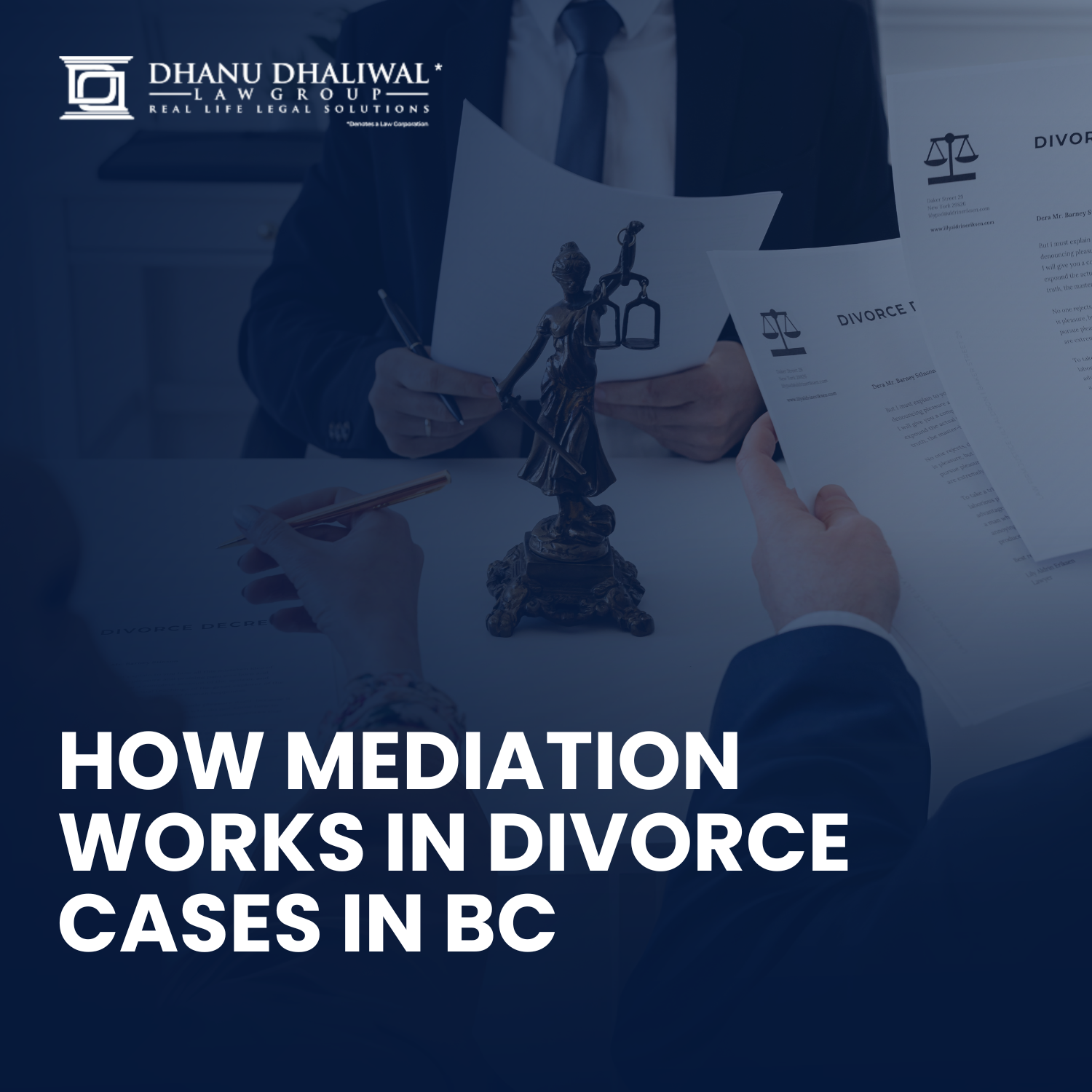Navigating Divorce Through Mediation
Divorce is one of life’s most challenging events. The emotional, financial, and legal complexities can leave couples feeling overwhelmed. However, in British Columbia (BC), mediation offers an effective and compassionate alternative to traditional courtroom battles. If you’re looking for a solution that saves time, money, and stress while fostering cooperation, mediation may be the answer.
At Dhanu Dhaliwal Law Group, we’re dedicated to helping our clients navigate divorce with dignity, understanding, and support. This guide explains how mediation works in divorce cases and why it could be the best option for you.
What Is Divorce Mediation?
Mediation is a voluntary, out-of-court process where a neutral third party—called a mediator—helps divorcing couples resolve disputes. Unlike litigation, which pits parties against each other in a courtroom, mediation promotes cooperation and open communication.
Key issues that are typically addressed in mediation include:
- Division of property and assets
- Child custody and parenting arrangements
- Child and spousal support agreements
The mediator does not make decisions for you. Instead, they guide discussions to help both parties reach mutually agreeable solutions tailored to their specific needs. Learn more about sole child custody and emergency custody orders.
How Mediation Works in Divorce Cases
1. Choosing a Qualified Mediator
The first step in the mediation process is selecting a skilled and neutral mediator. In BC, mediators are often trained in law, family therapy, or conflict resolution. Look for professionals with experience in family law and divorce matters to ensure a productive process.
2. The Initial Meeting
Both parties will meet with the mediator to outline the goals of the mediation process. The mediator will explain the rules, ensure both parties understand their rights, and set ground rules for respectful communication.
3. Information Sharing
Transparency is crucial in mediation. Both parties will need to disclose financial information, including assets, debts, and income. This ensures that all discussions and agreements are fair and well-informed.
4. Negotiation Sessions
During a series of structured meetings, the mediator facilitates discussions on the key issues. They help the couple explore options, clarify concerns, and work toward solutions that benefit everyone involved.
5. Reaching an Agreement
Once both parties agree on the terms, the mediator drafts a Memorandum of Understanding. This document outlines all agreed-upon resolutions, which can then be formalized into a legal separation agreement with the help of individual lawyers.
Why Mediation Is Better Than Litigation
1. Cost-Effective
Mediation is typically much less expensive than going to court. Couples avoid the high legal fees and lengthy litigation process that often come with divorce.
2. Time-Saving
The court system is often slow, with cases sometimes taking years to resolve. Mediation can be scheduled at the convenience of both parties, often leading to faster outcomes.
3. Confidential and Private
Unlike court proceedings, mediation is private and confidential. This keeps sensitive family matters out of the public record.
4. Promotes Cooperation
Mediation focuses on collaboration rather than conflict. This can reduce tension and help preserve relationships, especially when co-parenting is involved.
5. Customizable Solutions
The agreements reached in mediation are flexible and tailored to the unique needs of each family. This often leads to more satisfying and sustainable outcomes.
The Importance of Mediation During Divorce
Mediation is more than just a legal tool—it’s a way to approach divorce with empathy and respect. For couples with children, mediation prioritizes the well-being of the family, creating co-parenting plans that minimize conflict and protect the emotional health of the children.
For couples without children, mediation can still provide a more peaceful resolution that avoids the emotional toll of adversarial court battles.
Ultimately, mediation allows both parties to maintain control over their future, rather than leaving critical decisions in the hands of a judge.
Dhanu Dhaliwal Law Group: Supporting You Through Mediation
At Dhanu Dhaliwal Law Group, we understand that divorce is not just a legal matter—it’s a personal journey. Our experienced family law team is here to guide you through every step of the mediation process, ensuring that your rights and interests are protected.
We prioritize solutions over conflict and help our clients reach agreements that lay the groundwork for a brighter future. Whether you’re considering mediation or need support during your divorce, we’re ready to help.
Ready to Resolve Your Divorce Amicably?
If you’re facing divorce and want to explore the benefits of mediation, the Dhanu Dhaliwal Law Group is here to assist you. We provide compassionate, expert guidance to help you achieve fair and peaceful resolutions without unnecessary stress.






